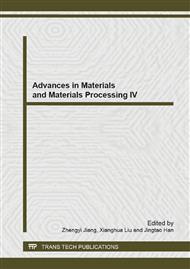p.473
p.479
p.484
p.488
p.493
p.497
p.501
p.507
p.512
Influence of Activated Carbon to the Hydrogen Storage Characteristics of THF Hydrate
Abstract:
High pressure hydrate experiment device was used to research the influence of active carbon to the hydrogen storage characteristics of THF hydrates in volume 502.4 ml and 1°C. The results show that within the experimental pressure range, the induction time changes irregularly, so active carbon has no apparent effect on the induction time, but has obvious influence to the pressure drop, under same initial pressure, the pressure drops with activated carbon are larger than that without activated carbon; With activated carbon, the higher the initial pressure the larger the pressure drop. Because the pressure drop is proportional to the hydrogen storage density, so the larger the pressure drop, the higher the hydrogen storage density. When the initial pressure is 8.4 MPa, with activated carbon the hydrogen storage density (0.0082wt%) is far higher than that (0.0031wt%) without it. So activated carbon can promote the hydrogen storage density of THF hydrate.
Info:
Periodical:
Pages:
493-496
Citation:
Online since:
February 2014
Authors:
Keywords:
Price:
Сopyright:
© 2014 Trans Tech Publications Ltd. All Rights Reserved
Share:
Citation:


